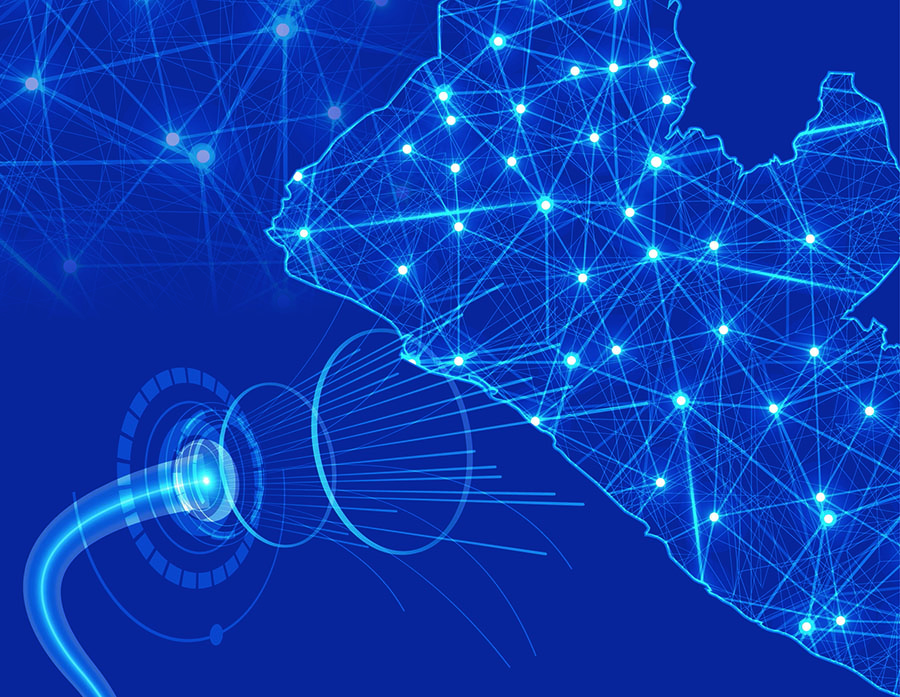Let us know what type of content you'd like to see more of. Fill out our three question survey.
Realizing Inclusive Connectivity in Liberia Through a Trusted Technical Engagement
Mar 2, 2023
Transmitting data through transparent fibers barely thicker than a human hair, the Africa Coast to Europe (ACE) optical-fiber submarine cable system revolutionized Liberia’s information and communications technology (ICT) sector. Landing off the shore of Liberia’s capital, Monrovia, in 2011, this 17,000-kilometer cable that stretches from France to South Africa marked the country’s introduction to high-speed internet. Providing connectivity to 24 countries, the cable also demonstrated a commitment to reduce the digital divide and democratize internet access in Africa through secure, diverse, and resilient ICT infrastructure investments.
While ACE, made possible through a landmark agreement between a consortium of telecommunications companies and member countries, significantly increased connectivity in Monrovia, the lack of optical fiber cables beyond the capital resulted in low connectivity in Liberia’s rural areas. Moreover, Liberia lacks a much-needed system of high-speed networks linked together with fiber-optic connections to establish what is formally known as a fiber backbone—a critical prerequisite to fully maximize the ACE cable’s potential.
Since the ACE cable’s deployment, much work has been done to enhance competition and growth among internet service providers (ISPs) and mobile network operators to provide greater connectivity options to Liberian consumers. Under a revised technology license issued by the Liberia Telecommunications Authority (LTA) in 2015, the regulatory authority authorized wireless carriers to build their own optical-fiber cable infrastructure. However, the lack of coherent regulatory frameworks to guide the deployment of optical fibers across Liberia and no concrete national fiber backbone severely hampered connectivity efforts beyond Monrovia—exacerbating the digital divide.

Photo: Stefan Peterson.
Addressing the Connectivity Challenge
Recognizing these challenges, the U.S. Agency for International Development (USAID) deployed the Promoting American Approaches to ICT Policy and Regulation (ProICT) activity. Funded under the Digital Connectivity and Cybersecurity Partnership (DCCP) and implemented by DAI’s Digital Frontiers project, ProICT provides technical assistance and capacity building through embedded experts to help developing country governments establish ICT policy and regulatory frameworks. In Liberia, ProICT experts from Integra Government Services International and Atlantic Telecoms & Media Cameroon reviewed the state of optical-fiber cable deployment and identified strategic ways the LTA could strengthen connectivity, develop the nation’s fiber backbone, and maximize the use of the ACE cable. Subsequently, ProICT experts developed a specific policy and regulatory framework tailored to ensure a holistic and coordinated approach in the deployment of optical-fiber cable across Liberia. The framework, disseminated through training to government stakeholders, including the LTA, provided concrete recommendations on how the LTA can strengthen its new optical-fiber cable rollout strategy to drive both competition and widespread internet coverage in-country.
Influenced by the ProICT engagement, the LTA then successfully negotiated an amendment to its national backbone licensing agreement with a technology company, CSquared, in 2021 to further expand internet coverage nationwide. While CSquared has been an optic-fiber wholesale provider in Liberia since 2017—the result of a $12 million first-of-its-kind partnership between USAID, Google, and CSquared to further help Liberians rebuild after the 2014–2016 Ebola outbreak—the company was limited to providing services in the Monrovia area. The amendment, whose licensing conditions drew directly from language drafted by ProICT’s experts and provided in the policy and regulatory framework, now authorizes CSquared to deploy fiber-optic cables anywhere in the country.
“The amended agreement is good news for Liberian consumers and internet users,” said H. Sama Nwana, Managing Partner at Cenerva, Director at Atlantic Telecoms & Media, and partner to Digital Frontiers’ ProICT Liberia activities. “With the expansion, coverage will extend from Monrovia to Guinea, and to the Cote d’Ivoire border covering counties like Bong, Margibi, and Nimbal. It should also cover at least 10 major towns. This increase in connectivity will provide more people with access to the digital economy, bringing about a range of benefits to individuals, society, and the economy.”
Capitalizing on the amended agreement between CSquared and the LTA, USAID announced the Agency’s latest public-private partnership with the Africa-based broadband provider under USAID’s Digital Invest program in January. A part of DCCP and a flagship project of the Partnership for Global Infrastructure and Investment announced by President Biden in June 2022, this partnership will enable CSquared to actualize the 350-kilometer open-access fiber backbone in Liberia—bringing internet access to as many as one million people.
For USAID, this public-private partnership marks a strategic push in continuing to support digital connectivity infrastructure and digital financial services that strengthen open, inclusive, and secure digital ecosystems in emerging markets. For CSquared, deploying new optical fiber cables will serve as a catalyst towards universal access to online health, education, banking, and government services—transforming the lives of ordinary Liberians. In granting an amended license to CSquared to expand connectivity to the entire country, made possible through the ProICT engagement, the LTA not only cleared the way for the creation of new broadband infrastructure back in 2021—it propelled the nation towards greater connectivity and more inclusive economic growth.
Alexander Riabov is a Senior Communications Specialist on DAI’s Digital Frontiers project.